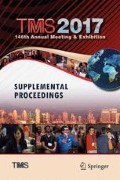Abstract
Distortions are critical in metal additive manufacturing, since they increase manufacturing costs, times and generate wastes and scraps due to dimensional inaccuracies in newly developed parts. Currently, corrective measures are often not taken until production step and they are mainly based on trial an error approach. Alternatively, Design Against Distortion paradigm is focused on the development of numerical modelling strategies which can anticipate distortions even from the design stage. This work is focused on the development of a rapid distortion prediction numerical methodology applicable to selective laser melting (SLM) process, taking into account the influence of different process variables, like scanning parameters and scanning strategy. This methodology is applicable to predict distortion behaviour of a real component manufactured by SLM, in order to determine the best supporting strategy and build up orientation. Therefore, current developments entail an innovative way of designing and manufacturing SLM manufactured parts which are more robust against distortions.
References
B. Baufeld, O. Van der Biest, R. Gault, Additive manufacturing of Ti–6Al–4 V components by shaped metal deposition: microstructure and mechanical properties. Mater. Des. 31(Supplement 1), S106–S111 (2010)
N. Keller, V. Ploshikhin, New method for fast predictions of residual stress and distortion of AM parts, Solid Freeform Fabrication Symposium, 2014, Austin, Texas, Conference paper, pp. 1229–1237
G. Branner, Modellierung transienter Effekte in der Struktursimulation von Schichtbauverfahren (2010)
G. Branner, J. Schilp, T.A. Krol, Modelle zur thermomechanischen Simulation metallverarbeitender Strahlschmelzprozesse (2009)
T.A. Krol, S. Westhäuser, M.F. Zäh, J. Schilp, G. Groth, Development of a simulation-based process chain—strategy for different levels of detail for the preprocessing definitions, vol. 21 (2011), pp. 135–140
C. Seidel, T.A. Krol, J. Schilp, M.F. Zaeh, C. Groth, Ansaetze zur rechenzeiteffizienten Struktursimulation additiv gefertigter, filigraner Bauteile. CADFEM GmbH (ed.): Ansys Conference & 30. CADFEM Users’ Meeting. (Kassel; 2012)
N. Keller, F. Neugebauer, H. Xu, V. Ploshikhin, Thermo-mechanical simulation of additive layer manufacturing of titanium aerospace structures, no. figure 1 (2013)
C. Seidel, M.F. Zaeh, J. Weirather , T.A. Krol, J. Schilp, D. Schmid, Prozessnahe Modellierung des Materialverhaltens beim Laserstrahlschmelzen als Grundlage für die Ergebnisgenauigkeit hinsichtlich der Bauteilmaßhaltigkeit und des Eigenspannungszustandes. In: CADFEM GmbH (ed.): ANSYS Conference & 31th CADFEM Users’ Meeting. (Mannheim; 2013)
C. Seidel, M.F. Zaeh, J. Weirather, M. Wunderer, T.A. Krol, J. Schilp, C. Groth, Simulation of the laser beam melting process—an approach for an efficient geometry modelling of complex lightweight parts, no. c
F. Neugebauer, N. Keller, V. Ploshikhin, F. Feuerhahn, H. Köhler, Multi scale FEM simulation for distortion calculation in additive manufacturing of hardening stainless steel, in Proceedings of Fraunhofer Direct Digital Manufacturing Conference (2014), pp. 13–23
A. Bachorski, M. Painter, A. Smailes, M. Wahab, Finite-element prediction of distortion during gas metal arc welding using the shrinkage volume approach. J. Mater. Process. Technol. 92–93, 405–409 (1999)
A. Lundbäck, Modelling and simulation of welding and metal deposition. Aerosp. Eng.
Author information
Authors and Affiliations
Corresponding author
Editor information
Editors and Affiliations
Rights and permissions
Copyright information
© 2017 The Minerals, Metals & Materials Society
About this paper
Cite this paper
Sebastian, M.S., Setien, I., Mancisidor, A.M., Echeverria, A. (2017). SLM (Near)-Net-Shape Part Design Optimization Based on Numerical Prediction of Process Induced Distortions. In: TMS, T. (eds) TMS 2017 146th Annual Meeting & Exhibition Supplemental Proceedings. The Minerals, Metals & Materials Series. Springer, Cham. https://doi.org/10.1007/978-3-319-51493-2_12
Download citation
DOI: https://doi.org/10.1007/978-3-319-51493-2_12
Published:
Publisher Name: Springer, Cham
Print ISBN: 978-3-319-51492-5
Online ISBN: 978-3-319-51493-2
eBook Packages: Chemistry and Materials ScienceChemistry and Material Science (R0)

